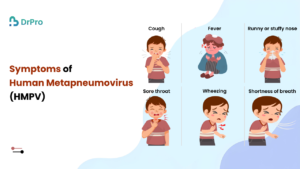Human metapneumovirus (HMPV) is a virus that initially presents similar to the flu, and causes coughing, wheezing, a runny nose, and a sore throat. However, most of the time it is not serious, children and young adults, elderly people, and people with weak immunity are subjected to severe cases. HMPV is very prevalent in the community with about 90% of children suffering from it before the age of 5.
What is Human Metapneumovirus (HMPV)?
Human metapneumovirus (HMPV) is a virus that can cause a lot of flu-like symptoms, which can easily be mistaken for the common cold. This results in upper respiratory infections although it can occasionally produce lower respiratory illness such as pneumonia, asthma attack, or worsening of COPD. HMPV infections are reported to be most common in the winter and early spring.
Majority of the people contract HMPV infections before they are 5 years of age. However, since one can get HMPV again, the symptoms do not tend to be as severe after the first bout.
Is Human Metapneumovirus (HMPV) Just a Cold?
In most cases, Human Metapneumovirus (HMPV) is like the flu or a common cold but in severe cases, it causes severe conditions. Young children are vulnerable since severe symptoms are more likely during the first infection. When infected by HMPV once, you will get some kind of immunity but the subsequent symptoms will be flu-like, cold-like symptoms. They include high-risk categories such as people of age above 65 years and people with breathing issues or a weakened immune system.
How Common is Human Metapneumovirus?
HMPV is thought to be responsible for 10% to 12% of respiratory tract infections in children, according to studies. However, these are not usually severe and between 5 to 16% of children will go on to develop a lower respiratory tract infection like pneumonia.
Symptoms and Causes
What are the symptoms of Human Metapneumovirus (HMPV)?

Symptoms of Human Metapneumovirus (HMPV) include:
- Cough
- Fever
- Runny or stuffy nose
- Sore throat
- Wheezing
- Shortness of breath (dyspnea)
What Causes a Human Metapneumovirus (HMPV) Infection?
HMPV is a tiny germ caused by a virus: a pathogen that uses the host’s cells to reproduce additional copies of the virus. This particular virus falls under the family that triggers respiratory syncytial virus (RSV), measles, or mumps.
How is Human Metapneumovirus (HMPV) Transmitted?
HMPV is transmitted from one person to another especially when touching an infected person or a contaminated object. Common transmission methods include:
- Coughing and sneezing
- Shaking hands, hugging, or kissing
- Touching surfaces or objects, such as phones, door handles, keyboards, or toys
What are the Risk Factors for Human Metapneumovirus (HMPV)?
While anyone can contract HMPV, you are at a higher risk for severe illness if you:
- Are younger than 5 (especially premature infants) or older than 65
- Have a weakened immune system (due to conditions like HIV, cancer, autoimmune disorders, or medications that suppress immunity)
- Have asthma or chronic obstructive pulmonary disease (COPD)
What are the Complications of Human Metapneumovirus (HMPV)?
In some cases, HMPV can lead to complications that may be serious and require hospitalization. These complications include:
- Bronchiolitis
- Bronchitis
- Pneumonia
- Asthma or COPD flare-ups
- Ear infection (otitis media)
Diagnosis and Tests

How is Human Metapneumovirus (HMPV)Diagnosed?
Most healthcare providers diagnose HMPV by reviewing your symptoms and past medical history. They might rub a soft cotton tip on your throat or nose, and this is followed by a laboratory test on viruses or any other infection. Cough is one of the conditions that are likely to make you be tested for HMPV but this is often conducted if your symptoms are severe.
At times, the provider may also recommend a bronchoscopy, or certain chest X-rays, to review changes in the airways of the lungs from the initial evaluation.
Management and Treatment
How is Human Metapneumovirus Treated?
In Human Metapneumovirus (HMPV), there are no antiviral drugs available to cure the infection. Fortunately, for most people, the treatment is done at home until they are cured.
In case your child or you develop complications, then serious illness may warrant hospitalization for monitoring and treatment. Treatment may include:
Oxygen therapy: If breathing is difficult, extra oxygen may be provided through a tube in the nose or a mask on the face.
IV fluids: Fluids delivered through an IV can help maintain hydration.
Corticosteroids: Steroids may reduce inflammation and help alleviate some symptoms.
Do You Need Antibiotics for Human Metapneumovirus?
Unfortunately, antibiotics are only prescribed to treat bacterial infections, and since HMPV is a viral infection, it will not respond to antibiotics. However, if a bacterial infection or secondary infection develops along with pneumonia because of HMPV your doctor might prescribe antibiotics to treat the new infection.
Prevention
Can You Prevent a Human Metapneumovirus Infection?
You can reduce your risk of contracting Human Metapneumovirus (HMPV) and other infectious diseases by following these preventive measures:
- Wash your hands frequently with soap and water. If soap and water aren’t available, use an alcohol-based hand sanitizer.
- Cover your nose and mouth with your elbow (not your bare hand) when you cough or sneeze.
- Avoid close contact with others when you or they are sick with a cold or any contagious illness.
- Consider wearing a mask if you’re sick and need to be around others.
- Avoid touching your face, especially your eyes, nose, and mouth.
- Don’t share food, utensils, or cups with others.
How Do I Take Care of Myself?
You can manage mild, cold-like symptoms of Human Metapneumovirus (HMPV) at home by:
- Drinking plenty of fluids to stay hydrated.
- Taking over-the-counter (OTC) medications like pain relievers, decongestants, and cough suppressants to ease symptoms. However, don’t give any medications to children without consulting their pediatrician first, as some medications safe for adults may not be suitable for kids.
What Questions Should I Ask My Doctor?
If you have concerns about HMPV, consider asking your doctor the following questions:
- What can I do to manage my symptoms at home?
- Are there any specific treatments I should be aware of for HMPV?
- Should I be tested for HMPV, or is it likely to be another illness?
- Are there any warning signs that would indicate my condition is worsening?
- How can I prevent spreading HMPV to others?
A Note from Wellness DrPro Health
We want you to be healthy at Wellness DrPro Health and offer professional services to ensure that you run your health efficiently. Whether you’re facing routine issues that people get sick from, such as Human Metapneumovirus (HMPV), or worrying about your physical health generally, rest assured that we will endeavor to give you the knowledge, help, and care you need. Please use professional advice from your doctor, and do not forget that an early diagnosis, prevention, and proper care are your main assets to a healthy life. Vaccine updates, symptoms, and protection, it’s all here and with us, DrPro Health, by your side.
FAQs
Q1. What is HMPV?
HMPV is a respiratory virus that causes symptoms similar to the common cold or flu. It mainly affects children, elderly individuals, and those with weakened immune systems.
Q2. What are the symptoms of HMPV?
Common symptoms include cough, fever, runny nose, shortness of breath, and wheezing. In some cases, it can lead to more severe respiratory issues like pneumonia.
Q3. How is HMPV spread?
The virus spreads through respiratory droplets when an infected person coughs or sneezes, or by touching surfaces contaminated with the virus.
Q4. Is there a treatment for HMPV?
There is no specific antiviral treatment for HMPV. Management includes symptom relief with fluids, rest, and over-the-counter medications like pain relievers and cough suppressants.
Q5. How can I prevent HMPV?
To reduce the risk of infection, practice good hygiene like washing hands frequently, avoiding close contact with sick individuals, and covering your mouth when coughing or sneezing.

